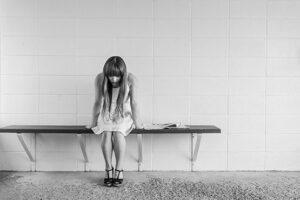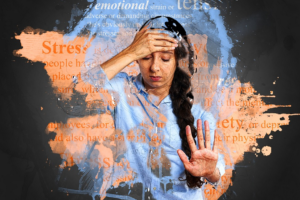Do you wonder if you might need therapy for anxiety or depression? Know that it is normal to feel anxious or depressed sometimes. Difficult life situations happen to us all. Losing a loved one. Going through a financial downturn or getting “downsized.” Divorcing. Stressors like these can cause a person to feel sad, lonely, scared, nervous, or anxious.
 But for some people, these feelings linger even after the stressor is gone. They may experience these feelings daily or nearly daily – seemingly for no good reason – making it hard to function normally. These people may have an anxiety disorder, depression or both. Therapy can be helpful.
But for some people, these feelings linger even after the stressor is gone. They may experience these feelings daily or nearly daily – seemingly for no good reason – making it hard to function normally. These people may have an anxiety disorder, depression or both. Therapy can be helpful.
Depression and anxiety are different. Each disorder has its own causes and its own symptoms. However, it is not uncommon for someone with anxiety to also have a depression or vice versa. Nearly half of all people diagnosed with depression also have a diagnosed anxiety disorder, too. But the good news: both disorders are highly treatable with depression and anxiety therapy.
Anxiety
An anxiety disorder goes beyond simple worry. For people with an anxiety disorder, worry and fear are constant and overwhelming, even immobilizing. There are a number of types of anxiety disorders including panic disorder, social anxiety disorder, specific phobias, and generalized anxiety disorder. And symptoms vary depending on the type of anxiety disorder, but common symptoms include:
- Feelings of panic, fear, and uneasiness

- Problems sleeping
- Cold or sweaty hands and/or feet
- Shortness of breath
- Heart palpitations
- An inability to be still and calm
- Dry mouth
- Numbness or tingling in the hands or feet
- Nausea
- Muscle tension
- Dizziness
While the exact cause of anxiety disorders is unknown, anxiety is not the result of personal weakness, a character flaw, or poor upbringing. Rather, research shows anxiety disorders result from a combination of factors. These can include changes in the brain and environmental stress.
Effective treatment includes therapy, relaxation therapy, lifestyle (and sometime dietary) changes, and, for some, medication. Each Life Care Wellness therapist has training in the treatment of anxiety disorders. Call Life Care Wellness today at 630-423-5935 to begin healing today with anxiety therapy.
Depression
When a person feels discouraged, sad, hopeless, unmotivated, or disinterested in life in general and these feelings last for a short period of time, it may be a case of “the blues.” However, when these feelings last longer than 2 weeks, and when they interfere with daily activities such as caring for oneself or family, socializing with friends, or going to work or school, it is probably a major depressive episode.
Depression affects how a person thinks, feels, behaves, and functions. People with depression often experience symptoms similar to those of an anxiety disorder, such as nervousness, irritability, and problems sleeping and concentrating.
Interestingly, many people who develop depression have a history of an anxiety disorder earlier in life. It is estimated that 3 to 5 percent of people suffer from major depression at any one time, and that the lifetime risk of experiencing a major depressive episode is about 17 percent.
There are three main types of depressive disorders: major depression, persistent depressive disorder, and bipolar disorder.
Major Depression
Major depression involves at least five of the bulleted symptoms below for at least a two-week period. The depressive episode interferes with work, or study, eating, sleeping, and general functioning. Major depressive episodes may occur once or twice in a lifetime, or recur frequently. Or they can occur spontaneously, during or after the death of a loved one, a romantic breakup, a medical illness, or other life event. Some people with major depression may feel that life is not worth living and some will attempt to end their lives.
- Persistent sad, anxious or “empty” mood
- Feelings of hopelessness, pessimism

- Feelings of guilt, worthlessness, helplessness
- Loss of interest or pleasure in hobbies and activities, including sex
- Decreased energy, fatigue, feeling “slowed down”
- Difficulty concentrating, remembering, making decisions
- Insomnia, early-morning awakening, or oversleeping
- Low appetite and weight loss or overeating and weight gain
- Thoughts of death or suicide, suicide attempts
- Restlessness, irritability
- Physical symptoms that persist and do not respond to treatment, such as headaches, digestive disorders and pain for which no other cause can be diagnosed.
Persistent Depressive Disorder
Persistent depressive disorder, or PDD, (formerly called dysthymia) is a type of depression that continues for at least two years. Although it is less severe than major depression, it involves the same symptoms as major depression: low energy, poor appetite or overeating, and insomnia or oversleeping. Also, it can manifest as stress, irritability, and a lack of pleasure from most activities. People with PDD typically have a negative outlook on most things.
Bipolar Disorder
Bipolar disorder (formerly called manic-depression) is characterized by a mood shifts that swing from severe highs (mania) or mild highs (hypomania) to severe lows (depression). During the manic phase of this cycle, a person may experience abnormal or excessive elation, irritability, a decreased need for sleep, grandiose notions, increased talking, racing thoughts, increased sexual desire, markedly increased energy, poor judgment, and inappropriate social behavior. During the depressive phase, the person experiences the same symptoms as would a sufferer of major depression. While mood swings from mania to depression are often gradual, they can occur abruptly and/or frequently for some people.
While the exact cause of depression is not known, like anxiety disorders, is is believed to be caused by a combination of factors, including changes in the brain and environmental stress. Typical depression therapy treatment includes psychotherapy, lifestyle (and sometime dietary) changes, and, for some, medication.
Call for Depression and Anxiety Therapy Today
Each Life Care Wellness therapist is trained in the treatment of anxiety and depression. Call Life Care Wellness at 630-423-5935 to schedule your first depression or anxiety therapy appointment today.


